There is a misconception among many Christians that the reason Jesus was arrested, put on trial, and crucified was because he claimed to be God. One pastor writes:
[Jesus] died because he acted like the incarnate Son of God, spoke like the incarnate Son of God, and did not deny the accusation when the world hated him for being the incarnate Son of God.[1]
Passages such as John 5:18, 8:58-59, and 10:30-33 fuel this speculation thanks to the Platonically-inspired Church Fathers who read Scripture through a Greek philosophical lens. Their influence has led many Christ-followers to interpret these passages to mean that Jesus is God. But Jesus only claimed to be the Christ, not a theorized second member of a triune godhead as expressed in fourth century creeds.
On the other hand, if it is true that Jesus was crucified for declaring his divinity, we should be able to find Biblical evidence to support this claim. In this post, we will investigate the passages relating to Jesus’ arrest, trials,[2] and subsequent crucifixion. It is time to let the evidence speak for itself.
The Examination by Annas
After Jesus was arrested in the Garden of Gethsemane by a Roman cohort, he was taken to Annas, the former high priest and father-in-law of Caiaphas, the current high priest. All we are told is that Annas questioned Jesus about “His disciples, and about His teaching.”[3] At this point, we are not given any information regarding the purpose of his arrest or the charges made against him.
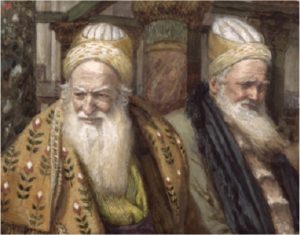
The Examination by Caiaphas and the Sanhedrin
Afterward, Annas sent Jesus to Caiaphas and the Sanhedrin, who tried to obtain a “false testimony against Jesus, so that they might put him to death.”[4]
Matthew 26:60-68 (NASB) They did not find any, even though many false witnesses came forward. But later on two came forward, 61 and said, “This man stated, ‘I am able to destroy the temple of God and to rebuild it in three days.'” 62 The high priest stood up and said to Him, “Do You not answer? What is it that these men are testifying against You?” 63 But Jesus kept silent. And the high priest said to Him, “I adjure You by the living God, that You tell us whether You are the Christ, the Son of God.” 64 Jesus *said to him, “You have said it yourself; nevertheless I tell you, hereafter you will see THE SON OF MAN SITTING AT THE RIGHT HAND OF POWER, and COMING ON THE CLOUDS OF HEAVEN.” 65 Then the high priest tore his robes and said, “He has blasphemed! What further need do we have of witnesses? Behold, you have now heard the blasphemy; 66 what do you think?” They answered, “He deserves death!” 67 Then they spat in His face and beat Him with their fists; and others slapped Him, 68 and said, “Prophesy to us, You Christ; who is the one who hit You?”[5] (emphasis added)
Some interpret the high priest’s charge of blasphemy as an indicator that he understood Jesus to be claiming he was God. But a closer examination of the text reveals that the high priest did not ask Jesus if he was God, but if he was the Christ, the Son of God. Some misconstrue the title Son of God to mean God the Son, a phrase that is never used in Scripture. On the contrary, Son of God, when used of Jesus, is always a synonym for Christ or Messiah, that is, God’s anointed one. This is exactly how the high priest used the title:
Matthew 26:63 (NASB) But Jesus kept silent. And the high priest said to Him, “I adjure You by the living God, that You tell us whether You are the Christ, the Son of God.” (emphasis added)[6]
Jesus responded to the high priest’s question as to whether or not he was the Christ by quoting a Messianic prophecy from the book of Daniel. In this heavenly vision, the prophet sees the Son of Man, i.e., the Messiah, being presented before the Ancient of Days.[7] In this passage, the Messiah is clearly not God but is presented before God, who gives him dominion, glory, and a kingdom, things he would inherently possess if he was God.
In Luke’s account, we are told that when Jesus was in custody, those who were mocking and beating him were, in fact, blaspheming against Jesus:
Luke 22:63-65 (NASB) Now the men who were holding Jesus in custody were mocking Him and beating Him, 64 and they blindfolded Him and were asking Him, saying, “Prophesy, who is the one who hit You?” 65 And they were saying many other things against Him, blaspheming.
Like Caiaphas’ charge of blasphemy against Jesus for claiming to be the Christ, some might claim that Luke’s charge of blasphemy against those who struck Jesus is proof that Jesus is God, reasoning that only God can be blasphemed. However, the word blaspheme in Greek is blasphêmeô, and it means to slander, speak lightly of, to profane sacred things.[8] Thus, anyone can be blasphemed, as we see in Acts 13:45 where Paul was blasphemed, and in 1 Peter 4:4 where believers were blasphêmountes, that is, maligned. Consequently, the charge of blasphemy is not reserved for those who speak against God.
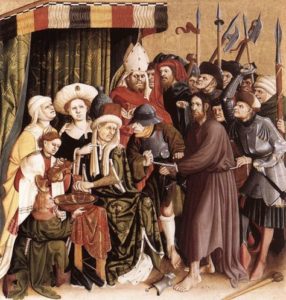
The First Examination by Pilate
Thus far, Jesus has appeared before the high priests and the Sanhedrin, and he has yet to be charged with claiming to be divine. But what about when he appeared before Pilate? Perhaps this is where he was accused of claiming to be the Almighty. But a survey of the gospel accounts reveals that the primary charge brought against Jesus before the Roman governor is that he claimed to be the king of the Jews, that is, the Christ:[9]
Matthew 27:11-14 (NASB) Now Jesus stood before the governor, and the governor questioned Him, saying, “Are You the King of the Jews?” And Jesus said to him, “It is as you say.” 12 And while He was being accused by the chief priests and elders, He did not answer. 13 Then Pilate *said to Him, “Do You not hear how many things they testify against You?” 14 And He did not answer him with regard to even a single charge, so the governor was quite amazed. (emphasis added)
We find that the other charges inferred in the above passage are specified elsewhere:
John 18:29-30 (NASB) Therefore Pilate went out to them and *said, “What accusation do you bring against this Man?” 30 They answered and said to him, “If this Man were not an evildoer, we would not have delivered Him to you.” (emphasis added)
Luke 23:1-5 (NASB) Then the whole body of them got up and brought Him before Pilate. 2 And they began to accuse Him, saying, “We found this man misleading our nation and forbidding to pay taxes to Caesar, and saying that He Himself is Christ, a King.” 3 So Pilate asked Him, saying, “Are You the King of the Jews?” And He answered him and said, “It is as you say.” 4 Then Pilate said to the chief priests and the crowds, “I find no guilt in this man.” 5 But they kept on insisting, saying, “He stirs up the people, teaching all over Judea, starting from Galilee even as far as this place.” (emphasis added)
In addition to charging Jesus with falsely claiming to be the Christ, the king of the Jews, they also accused him of being an evildoer, misleading their nation, being a tax evader, and stirring up the people. But never once, in any of the gospel accounts, is Jesus charged with claiming to be God.
The Examination by Herod
Luke records that when Pilate heard that Jesus was a Galilean, and therefore belonged to King Herod’s jurisdiction, he handed him off to be tried in his court:[10]
Luke 23:8-11 (NASB) Now Herod was very glad when he saw Jesus; for he had wanted to see Him for a long time, because he had been hearing about Him and was hoping to see some sign performed by Him. 9 And he questioned Him at some length; but He answered him nothing. 10 And the chief priests and the scribes were standing there, accusing Him vehemently. 11 And Herod with his soldiers, after treating Him with contempt and mocking Him, dressed Him in a gorgeous robe and sent Him back to Pilate. (emphasis added)
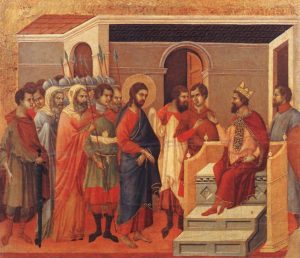
We are not given any specifics as to the charges brought against Jesus when he appeared before King Herod, but we have no reason to think that these same accusers brought different charges against him. The fact that Herod’s soldiers mockingly dressed Jesus in a special robe is in keeping with the charge that Jesus saw himself as king of the Jews.
Second Examination by Pilate
When King Herod sent Jesus back to Pilate, the governor examined him again:
John 19:4-7 (NASB) Pilate came out again and *said to them, “Behold, I am bringing Him out to you so that you may know that I find no guilt in Him.” 5 Jesus then came out, wearing the crown of thorns and the purple robe. Pilate *said to them, “Behold, the Man!” 6 So when the chief priests and the officers saw Him, they cried out saying, “Crucify, crucify!” Pilate *said to them, “Take Him yourselves and crucify Him, for I find no guilt in Him.” 7 The Jews answered him, “We have a law, and by that law He ought to die because He made Himself out to be the Son of God.” (emphasis added)
The Jews reiterated their charge before Pilate that Jesus had made himself out to be the Son of God. Again, this Hebraic title is synonymous with that of Messiah. This equivalency becomes apparent when the Jews voiced their opposition to Pilate’s desire to release Jesus:
John 19:12 (NASB) As a result of this Pilate made efforts to release Him, but the Jews cried out saying, “If you release this Man, you are no friend of Caesar; everyone who makes himself out to be a king opposes Caesar.” (emphasis added)
The Official Charge
Pilate eventually acquiesced and agreed to have the king of the Jews crucified:
John 19:14-15 (NASB) Now it was the day of preparation for the Passover; it was about the sixth hour. And he *said to the Jews, “Behold, your King!” 15 So they cried out, “Away with Him, away with Him, crucify Him!” Pilate *said to them, “Shall I crucify your King?” The chief priests answered, “We have no king but Caesar.” (emphasis added)
John 19:19-22 (NASB) Pilate also wrote an inscription and put it on the cross. It was written, “JESUS THE NAZARENE, THE KING OF THE JEWS.” 20 Therefore many of the Jews read this inscription, for the place where Jesus was crucified was near the city; and it was written in Hebrew, Latin and in Greek. 21 So the chief priests of the Jews were saying to Pilate, “Do not write, ‘The King of the Jews’; but that He said, ‘I am King of the Jews.'” 22 Pilate answered, “What I have written I have written.” (emphasis added)
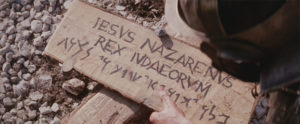
Historical sources for this period show that signage was placed around a criminal’s neck or above his body to describe the crime committed.[11] The Jews wanted the official charge against Jesus to read that “he said, ‘I am the King of the Jews.” They did not insist that it read, “he said, ‘I am the Great I Am.'” Nevertheless, Pilate let it stand as he had decreed it.
The Accusations Before the Roman Cohort
Further evidence gleaned from those involved in Jesus’ crucifixion corroborates our findings that Jesus was never accused of claiming to be God. When he was taken to the Praetorium, the Roman cohort mocked him for claiming to be a king, not for claiming to be deity:
Matthew 27:27-29 (NASB) Then the soldiers of the governor took Jesus into the Praetorium and gathered the whole Roman cohort around Him. 28 They stripped Him and put a scarlet robe on Him. 29 And after twisting together a crown of thorns, they put it on His head, and a reed in His right hand; and they knelt down before Him and mocked Him, saying, “Hail, King of the Jews!” (emphasis added)
Evidence at the Cross
The final evidence we will present are the statements made at the cross.[12]
Matthew 27:39-44 (NASB) And those passing by were hurling abuse at Him, wagging their heads 40 and saying, “You who are going to destroy the temple and rebuild it in three days, save Yourself! If You are the Son of God, come down from the cross.” 41 In the same way the chief priests also, along with the scribes and elders, were mocking Him and saying, 42 “He saved others; He cannot save Himself. He is the King of Israel; let Him now come down from the cross, and we will believe in Him. 43 “HE TRUSTS IN GOD; LET GOD RESCUE Him now, IF HE DELIGHTS IN HIM; for He said, ‘I am the Son of God.‘” 44 The robbers who had been crucified with Him were also insulting Him with the same words. (emphasis added)
Mark 15:32 (NASB) “Let this Christ, the King of Israel, now come down from the cross, so that we may see and believe!” Those who were crucified with Him were also insulting Him. (emphasis added)
Luke 23:35-43 (NASB) And the people stood by, looking on. And even the rulers were sneering at Him, saying, “He saved others; let Him save Himself if this is the Christ of God, His Chosen One.” 36 The soldiers also mocked Him, coming up to Him, offering Him sour wine, 37 and saying, “If You are the King of the Jews, save Yourself!” 38 Now there was also an inscription above Him, “THIS IS THE KING OF THE JEWS.” 39 One of the criminals who were hanged there was hurling abuse at Him, saying, “Are You not the Christ? Save Yourself and us!” (emphasis added)
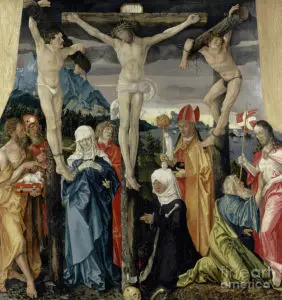
All who observed Jesus hanging on the cross understood the charge against him to be that he claimed to be the Christ. Note that all of the titles referenced in these passages are used synonymously: King of Israel, Son of God, King of the Jews, the Christ of God, and God’s Chosen One. Not once did they challenge Jesus for claiming to be God. That is because he never made that claim. Indeed, Jesus’ own words from the cross are very telling. Instead of claiming to be God, Jesus loudly declared he has a God:
Matthew 27:45-46 (NASB) Now from the sixth hour darkness fell upon all the land until the ninth hour. 46 About the ninth hour Jesus cried out with a loud voice, saying, “ELI, ELI, LAMA SABACHTHANI?” that is, “MY GOD, MY GOD, WHY HAVE YOU FORSAKEN ME?” (emphasis added)
If the Jews had thought that Jesus claimed to be God, that is the charge they would have brought against him. Without a doubt, it would have been a more egregious offense than claiming to be the Christ.
Some may try to detract from the overwhelming evidence by saying that the Jews charged Jesus with being a king instead of being divine to provoke the Roman government’s involvement. But that hypothesis is never mentioned or even alluded to in any Biblical text. On the contrary, the Jews were forthright when they told Pilate they wanted Jesus to die because he made himself out to be the Son of God.
John 19:6-7 (NASB) So when the chief priests and the officers saw Him, they cried out saying, “Crucify, crucify!” Pilate *said to them, “Take Him yourselves and crucify Him, for I find no guilt in Him.” 7 The Jews answered him, “We have a law, and by that law He ought to die because He made Himself out to be the Son of God.”
Pilate was astute enough to understand that the Jewish leaders handed Jesus over to him because they were envious of him.[13]
Once all the evidence is examined, it is clear to see that Jesus was arrested, tried, and crucified for claiming to be the Messiah. Passages used by Trinitarians to support the post-Biblical claim that Jesus is God should be reexamined in light of this conclusion.
[1] Kevin DeYoung, Why Did They Crucify Jesus? The Gospel Coalition, 07-30-13, accessed 8-08-21. The author uses the phrase Son of God as an equivalent to God the Son, or the incarnated Word of God.
[2] Jesus had five trials: Annas, Caiaphas, Pilate, Herod, and Pilate again.
[3] John 18:12-14, 19-24.
[4] Matthew 26:57-59.
[5] Mark 14:60-65 is the parallel passage.
[6] Another example of the title’s meaning is seen in Nathanael’s response to Jesus. The soon-to-be apostle used the titles Son of God and King of Israel synonymously in John 1:49.
[7] Daniel 7:13-14.
[8] https://biblehub.com/greek/987.htm
[9] Matthew 27:1-2, 11-12, 17-18, 21-24; Mark 15:1-15; Luke 23:1-7.
[10] Luke 23:6-7.
[11] Judith Green, The Sign of the Cross, Israel Institute of Biblical Studies, 09-19-14, accessed 08-08-21, https://blog.israelbiblicalstudies.com/jewish-studies/sign-cross-judith-green/
[12] Matthew 27:39-54; Mark 15:22-39; Luke 23:35-43; John 19:16-30.
[13] Matthew 27:18; Mark 15:10.
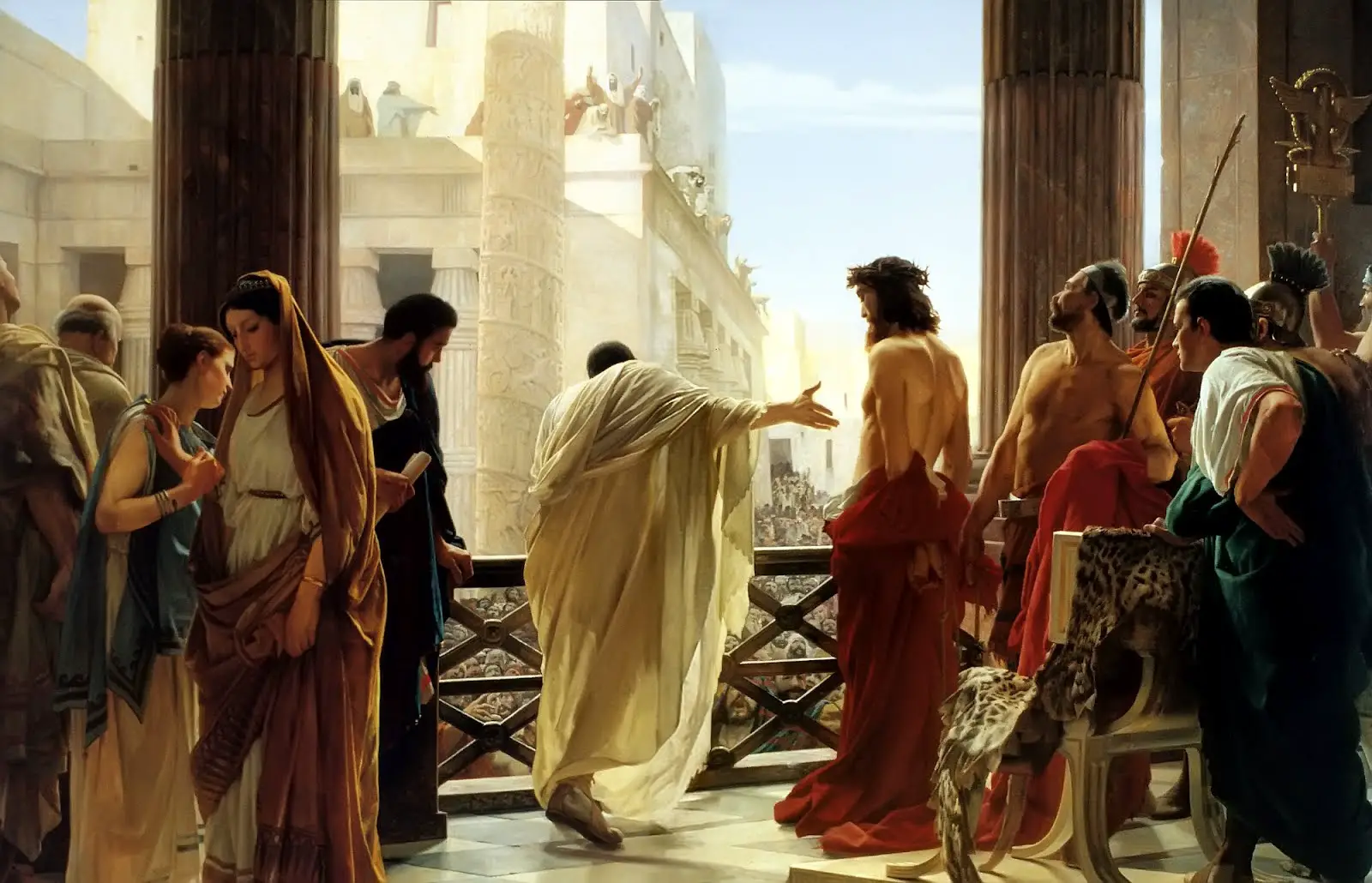



Quite fascinating, though I’ve known this truth from elsewhere, but here you left no stone unturned. Thanks.
Thanks, Undenna, for reading and commenting! What we learn about Jesus from his trial is critical to the formation of our Christology.
Blessings,
OGW
It seems the crucial argument for some Trinitarians here is that ‘the Son of God’ is indeed a divine title, and isn’t merely a synonym of ‘the Messiah’. There’s little evidence for this in the trial component of the NT, as you’ve carefully shown. Rather, the key argument here seems to be from John, specifically John 10:33-36. ““We are not stoning You for any good work,” said the Jews, “but **for blasphemy, because You, who are a man, declare Yourself to be God.**” 34 Jesus replied, “Is it not written in your Law: ‘I have said you are gods’? 35 If he called them gods to whom the word of God came—and the Scripture cannot be broken— 36 then what about the One whom the Father sanctified and sent into the world? How then can you accuse Me of blasphemy for stating that I am the Son of God?”
Hi Anthony,
Thanks for you observation. I agree that John 10:33 plays a role in the Trinitarian’s defense of Jesus’ supposed deity. I have addressed that verse, as well as John 10:10 in this post. Perhaps others will be interested in reading it as well.
Thanks again for your comment.
Blessings,
OGW
Jesus said in the Book of Revelation 22:13, “I am the Alpha and the Omega, the First and the Last, the Beginning and the End.” As C S Lewis rightly pointed it out, Jesus was either a madman, either God, nothing in between.
Jesus is The paradox which was solved through the dogma of Trinity by the Greeks centuries ago.
At least don’t spread limited perception and mental gymnastic. This channel just shows that some, cannot rise to a certain ontological level and think in a materialistic way. I am sorry to say this.
Thanks for commenting. Please take a moment to read the article on Who is the Almighty God of Scripture. I think you’ll find it Biblical and insightful as it addresses your post-Biblical, 4th century understanding of Jesus’ words in the book of Revelation. Indeed, as you state, the Trinitarian dogma is a product of 4th century Greek interpretation and not a first century Jewish understanding of Scripture.
OGW
Blessings,
OGW
Another point: a Muslim converted to Christianity because even in the Quran it is written that “Jesus is God’s word”, and he asked if ‘the word’ is created, or creator? He realised that God’s word is creator and thus converted to Christianity.
I think you’ll find the three-part series on Jesus as the Word of God (John 1:1-3) helpful. Here is part 1, part 2, and part 3. I appreciate your willingness to explore a different perspective.
Interesting, Read John 17:8.
Jesus was given the words. He was not the Word.
John 1:1 The writer intended a The God and a lesser a god. Two different words used in greek.
Just like Moses was a god onto Pharaoh.
Given Authority from God.
Jesus was also given Authority John 17:2.
Revelations is a interesting book.
The Author is different to Gospel of John. Very bad in Greek literature.
Revelations 22:13.
Is a statement from an Angel who apparently visited John, go back a few verses.
It was not Jesus who said this statement.
Alpha and Omega. Is the first letter and the last letter of the Greek alphabet.
Just like saying A to Z in English.
So how should we interpret John 1:1 which says, “In the beginning was the Word, and the Word was with God, and the Word was God.” and in verse 14 it says, “The Word became flesh and made his dwelling among us”?
Hi Riza,
Great question! Here is a three part series on John 1:1-3 that covers the passage in detail. I think you will find it very helpful.
Part 1
Part 2
Part 3
Blessings,
OGW
You are a liar! Jesus was accused of blasphemy and that is why they put Him to death!
Matthew 26:63
63 But Jesus kept silent. And the high priest answered and said to Him, “I put You under oath by the living God: Tell us if You are the Christ, the Son of God!”
64 Then the high priest tore his clothes, saying, “He has spoken blasphemy! What further need do we have of witnesses? 65 Look, now you have heard His blasphemy!
But Jesus kept silent. And the high priest answered and said to Him, “I put You under oath by the living God: Tell us if You are the Christ, the Son of God!”
Hi Jessica,
Thanks for reaching out, although with a bit of hostility 🙂
Respectfully, you are not understanding the word “blasphemy.” The Greek word blasphêmeô means to slander, speak lightly of, to profane sacred things.(See footnote 8 in the article). In other words, anyone can be blasphemed, not just God. Scripture says that Paul was blasphemed in Acts 13:45. Also, the Bible says that Peter was blasphemed in 1 Peter 4:4 (your translation may say maligned but it is the Greek word blasphêmountes). Thus, the charge of blasphemy is not reserved for those who speak against God.
Moreover, the high priest asked Jesus if he was the Christ, not if he was God. They accused Jesus of blaspheming because he said he was the Christ of God and they would not accept his testimony. In other words, they said he blasphemed God by falsely claiming to be the Christ.
The title Son of God is synonymous with Christ (see Matthew 26:63, which you quoted). Son of God is not the equivalent of “God the Son” a title that is never used of Jesus. I think you will find this article helpful. Son of God: Proof of Jesus’ Deity?
Thanks again for reaching out. I hope you will read the links I’ve included and get back with me. Blessings!